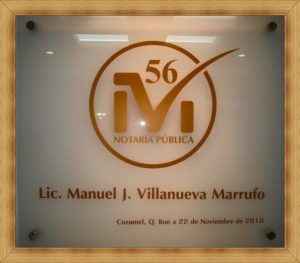What is a Mexican Corporation
What is a Mexican Corporation & What are their Benefits
Notario Manuel Villanueva explains Mexican Corporations & their workings…

What is a corporation?
When two or more people decide to join their equity and will to develop their productive projects, forming a corporation is advisable. We can define a corporation as an entity, organization or institution that undertakes commercial or civil activities providing goods or services to the community. A duly formed corporation is a separate entity from its shareholders or members, entitled to its own rights and obligations. Corporations are known as “legal entities”
One of the key advantages of forming a corporation to undertake business activities is disengaging equities: the corporate equity is different to the one each member holds. This means that obligations, risks and responsibilities are separate and independent. Thus, business’ risks will not affect the equity of shareholders or members, with some exceptions or notes depending on the type of corporation.
What are the different types of corporations?
In Mexico there are three large groups:
- Business Corporations: encompassing the Corporation, the Limited Liability Corporation and the General Partnership, among others.
- Professional Partnerships: grouping the Professional Partnerships and Non-Profit Organizations.
- Special Corporations: such as Unions or the Rural Production Companies, among others.
Each has its own particularities that can differentiate it from the others. For instance, a corporation with a dominant member holding absolute majority in the capital stock is not the same as one where there are only two shareholders with equal amount of membership interests. Another case is the one with working partners or the one that restricts the admission of new partners; another assumption is the corporation where a minority shareholders in interested in having access to the companies most relevant decisions or the one where a creditor has the right to turn its credit into capital stock. Other variants could be: participation of foreign nationals or where minors are shareholders, as well as developing activities contingent to special regulation.
Depending on the interest of presence, there could be a variation in rules associated with management,

administrators’ powers, formation requirements; requirements for the admission of new members or for the transmission of shares or membership interests, powers in the General Assembly and conditions to validate deliberations as well as to exercise the right to vote.
The proper legal counseling on issues associated with the operation and functioning of corporations, is an essential condition to bestow confidence upon businessmen within a climate of certainty to serve productivity. The Notary is a professional in Law with enough training to provide this counseling.
What is the role of the Notary in the formation of a corporation or a company?
In accordance with the provisions of the Law, the formation of a business corporation must be formalized before the Notary.
The Notary will attest the formation of the corporation through an incorporation charter that includes the corporate bylaws that define the sort of corporation under formation, as well as shareholders’ rights and obligations.
The incorporation charter will record the appointment of legal representatives who will hold the capacity to represent the corporation before others.
The Notary makes sure that regarding the process of formation all requirements provided by the Law are met. Taking into account the times these requirements must be met, we could classify them as: before the execution of the incorporation charter, alongside the execution of the incorporation charter and after its execution.
Among the first are: the authorization from the Ministry of Economy for the use of company or business name and some special authorizations from other agencies, taking into account the purpose of the corporation; the latter are met when the incorporation charter is drafted by the Notary: the authorization of the company or business name must be transcribed; record the possible admission or not of foreign nationals; include the requirements taken into account by the Law; verify the Federal Taxpayers’ Record of shareholders or members, and record the particulars of the Principals. All shareholders or members before the Notary then sign the incorporation charter.
After the incorporation charter has been executed, the Notary applies for its entry before the Public Business’ Register and the Federal Taxpayers’ Register. As well, will submit the notice of name use as authorized. Other notices are made to the federal tax authority regarding the Federal Taxpayers’ Register; the one addressed t the Nation Register on Foreign Investments and, in some cases, the one provided for by the Federal Act on Prevention and Identification of Operations Involving Illegally Obtained Resources.
In order to expedite the formation process of corporations (for business corporations and for limited liability corporations), Notaries use a technology tool consisting of a web portal operated by the Federal Government’s Ministry of Economy www.tuempresa.gob.mx, by which they manage and apply for the use of the name, besides registering the corporation before the Public Business’ Register and the Federal Taxpayers’ Register, paying the respective fees online.
In the event of amendments to corporate bylaws, transformation, dissolution or liquidation of the corporation, the application is done through the Public Business’ Register through another tool operated also by the Ministry of Economy named Fedanet-Signet, paying the fees online.
The role of new technologies in these cases is crucial and the Notary Office plays the role of a special filing spot for three Federal Government agencies’ processes; hence, Notary’s collaboration with Public Administration and businesspeople become quite effective and turnaround time is significantly reduced as on the same day the incorporation charter is executed it can be registered at the Public Business’ Register and at the Federal Taxpayers’ Register.
To say that the Notary is an ally of the businessperson, is an expression based upon an undisputed fact: the Notary is present in a considerable number of acts related with the development of the company; from its inception or incorporation to its dissolution, going through varied corporate decisions such as bylaws’ reforms, capital stock variations, vesting powers-of-attorney, mergers or demergers of corporations as well as purchase of real estate and take out credits.
Lic. Manuel J Villanueva offers experienced legal-corporate and Notary services. Public Notary Office #56 and its team of Lawyers and Professionals are particularly connected to the field of Legal Entrepreneurial Counseling both for Corporations as well as for Individuals. Public Notary office 56 is fully available through this website email, manuelv@notaria56.com or even through Facebook
Qué es una sociedad mercantil mexicana y cuáles son los beneficios
El Notario Manuel Villanueva explica lo que es una sociedad mexicana y su funcionamiento . . .
¿Qué es una sociedad?
Cuando dos o más personas deciden reunir capitales y voluntades para desarrollar sus proyectos productivos, lo recomendable es que constituyan una sociedad, la que podemos definir como una entidad, organización o institución a través de la cual se realizan actividades mercantiles o civiles que proporcionan bienes o servicios a la comunidad. Una sociedad debidamente constituida es una persona distinta a sus socios o accionistas, con capacidad para tener derechos y obligaciones. A las sociedades se les conoce como “personas morales”.
Una de las principales ventajas de constituir una persona moral para el desarrollo de actividades empresariales es la separación de patrimonios: el patrimonio de la sociedad es distinto al de cada uno de sus miembros, lo que significa que las obligaciones, riesgos y responsabilidades corren por separado y de manera independiente. Así, el riesgo del negocio no impactará los bienes que forman el patrimonio personal de cada socio o accionista, con algunas excepciones o matices dependiendo del tipo de sociedad.
¿Qué tipos de sociedades hay?
En México se dividen en tres grandes grupos:
- Sociedades Mercantiles: que agrupa a la Sociedad Anónima, la Sociedad de Responsabilidad Limitada y la
 Sociedad en Nombre Colectivo, entre otras.
Sociedad en Nombre Colectivo, entre otras. - Sociedades Civiles: que agrupa a las Sociedades Civiles y a las Asociaciones Civiles.
- Sociedades Especiales: como los Sindicatos o la Sociedad de Producción Rural, entre otras.
Cada empresa tiene sus particulares circunstancias que la pueden diferenciar de las demás. Por ejemplo, no es igual una sociedad en la que existe un socio dominante con mayoría absoluta del capital social a otra en la que hay solo dos socios con participaciones iguales. Otro caso es el de la sociedad en la que participan socios industriales o aquella en la que los socios desean restringir la admisión de nuevos socios; otro supuesto es el de la sociedad en la que participa un socio minoritario que le interesa tener acceso a las decisiones más relevantes de la empresa o el de la sociedad en la que participa un acreedor al que se le confiere el derecho de convertir su crédito en capital social. Otras variantes pueden ser la participación de extranjeros o la de menores de edad como socios, así como el desarrollo de actividades sujetas a una regulación especial.
Dependiendo de los intereses en presencia, pueden variar las reglas relacionadas con la forma de administración, facultades de los administradores, requisitos de constitución, requisitos para admitir nuevos socios o para transmitir las acciones o partes sociales, facultades de la asamblea general y las condiciones para la validez de sus deliberaciones así como para el ejercicio del derecho de voto.
Una adecuada asesoría legal sobre los aspectos relacionados con la operación y funcionamiento de las sociedades es condición indispensable para dotar a los empresarios de un clima de certidumbre que contribuya a la productividad. El notario es un profesional del derecho con capacitación suficiente para brindar esta asesoría.
¿Qué papel tiene el notario en la conformación de una sociedad o empresa?
De acuerdo con lo que dispone la Ley, el acto constitutivo de una sociedad mercantil debe formalizarse ante notario.
El notario dará fe pública de la constitución de la Sociedad a través de la redacción de la escritura constitutiva la que comprende los estatutos sociales, en los que se definen el tipo de sociedad que se formará, así como los derechos y obligaciones que los socios adquieren.
En la escritura constitutiva se hará constar el nombramiento de representantes legales, los que tendrán la capacidad para representar a la sociedad frente a terceros.
El notario se encarga de que se cumplan todos los requisitos establecidos en la ley en relación con el proceso de constitución de la sociedad. Atendiendo al momento en que deben cumplirse, podemos clasificar estos requisitos en: previos a la firma de la escritura constitutiva, simultáneos a la firma de dicha escritura y los posteriores a la misma.
Entre los primeros se encuentra la autorización que otorga la Secretaría de Economía para utilizar la denominación o razón social y algunas autorizaciones especiales por parte de otras dependencias, atendiendo al objeto de la sociedad; los segundos se cumplen al redactar el notario la escritura constitutiva: debe transcribir la autorización para uso de la denominación o razón, consignar la cláusula sobre la posible admisión o no de extranjeros, incluir los requisitos contemplados en la Ley, verificar las claves del Registro Federal de Contribuyentes de los socios o accionistas y consignar los datos de identificación de los otorgantes. La escritura constitutiva se firma por todos los socios o accionistas ante la presencia del notario.
Con posterioridad a la firma de la escritura constitutiva de la sociedad, el notario gestiona la inscripción de la misma en el Registro Público de Comercio y en el Registro Federal de Contribuyentes; además presenta el aviso de utilización de la autorización de uso de denominación. Otros avisos son los realizados a la autoridad hacendaria federal en relación con el Registro Federal de Contribuyentes, el que se dirige al Registro Nacional de Inversiones Extranjeras y, en algunos casos, el contemplado en la Ley Federal para la Prevención e identificación de Actividades con Recursos de Procedencia Ilícita.
Para agilizar el proceso de constitución de sociedades mercantiles (tratándose de la sociedad anónima y la sociedad de responsabilidad limitada) los notarios utilizan una herramienta tecnológica consistente en un portal web operado por la Secretaría de Economía del gobierno federal denominado www.tuempresa.gob.mx a través del cual gestionan y obtienen la autorización para uso de la denominación social, además inscriben a la sociedad en el Registro Público de Comercio y en el Registro Federal de Contribuyentes, efectuando el pago de los derechos respectivos en línea.
En el caso de modificación de los estatutos sociales, transformación, disolución y liquidación de sociedades mercantiles, efectúan el trámite de inscripción en el Registro Público de Comercio a través de otra herramienta tecnológica operada por la misma Secretaría de Economía denominada Fedanet-Siger, realizando el pago de los derechos respectivos en línea.
En estos casos el papel de las nuevas tecnologías es crucial y la oficina notarial hace las veces de ventanilla única para tres trámites que corresponden a dependencias del gobierno federal, con lo que la colaboración notarial con la Administración Pública y con los empresarios se vuelve muy efectiva y se reducen significativamente los tiempos de respuesta: el mismo día en que se firma la escritura constitutiva, la empresa puede quedar inscrita en el Registro Público de Comercio y en el Registro Federal de Contribuyentes.
Decir que el notario es aliado del empresario es una expresión que se funda en un hecho incuestionable: el notario está presente en un número considerable de actos relacionados con el desarrollo de la empresa, desde el acto mismo del nacimiento o constitución de la empresa hasta la disolución de la misma, pasando por decisiones corporativas muy variadas como reformas estatutarias, variaciones del capital social, otorgamiento de poderes, transformación, fusión o escisión de sociedades, así como la adquisición de inmuebles y la contratación de créditos
El Lic. Manuel J. Villanueva ofrece servicios legales-empresariales y notariales con experiencia. Las oficinas de la Notaría Pública #56 y el equipo de Abogados y profesionales se encuentran particularmente enlazados con la Asesoría Legal Empresarial tanto para empresas como para particulares. La Notaría Publica 56 se encuentra disponible a través de su sitio web, o al correo electrónico manuelv@notaria56.com , e inclusive a través de Facebook
______________________________
Una ex yanqui de Connecticut quien llama hogar a Cozumel desde hace más de 15 años. Laura escapó al Caribe hace años, desplazándose de una isla a otra dando clases de BUCEO. Se dedicó a perder el tiempo en Jamaica y finalmente se detuvo en Cozumel para pasar unas vacaciones de 2 semanas que aún no terminan. Convenciendo a sus padres que pagaran una elegante universidad privada, obtuvo su título en Periodismo y Laura crea semanalmente Cozumel 4You, medios sociales y artículos promocionales sobre la Isla y también es moderadora en el grupo Cozumel 4 You en Facebook que actualmente cuenta con 25,000 miembros. Fabián, s umuy tolerante marido, desde hace mucho tiempo se resignó a no tener vida privada, pues se ha visto implicado en los diversos proyectos y planes que urde Laura. Son orgullosos padres de diversos perros y gatos rescatados. Mientras contempla su paso a través de la vida en el Caribe mexicano,Laura continúa siendo la pesadilla en la existencia de su muy tradicional suegra mexicana.
- Cozumel Weather Conditions - February 27, 2026
- Cozumel Lobster Season 2026 - February 27, 2026
- Yucatan Miniature Pig - February 27, 2026
An ex-Connecticut Yankee who has called Cozumel home for over 18 years, Laura ran away to the Caribbean years ago, bumped around the islands teaching SCUBA diving, lost some time in Jamaica, and finally stopped in Cozumel for a 2 week vacation that hasn’t ended yet. With a degree in Journalism from a fancy private college she convinced her parents to pay for, Laura writes, edits, and creates the weekly Cozumel 4 You news, social media, and promotional articles about the island, as well as moderates the Cozumel 4 You Facebook group, which currently has over 25,000 members. Her long suffering husband, Fabian, has long since resigned himself to having zero private life, as he’s been involved in her various schemes and plots since his arrival. Proud parents to a variety of rescue dogs and cats, Laura continues to be the bane of her traditional Mexican mother-in-law’s existence, as she muses her way through life in the Mexican Caribbean. ______________________________ Una ex yanqui de Connecticut quien llama hogar a Cozumel desde hace más de 15 años. Laura escapó al Caribe hace años, desplazándose de una isla a otra dando clases de BUCEO. Se dedicó a perder el tiempo en Jamaica y finalmente se detuvo en Cozumel para pasar unas vacaciones de 2 semanas que aún no terminan. Convenciendo a sus padres que pagaran una elegante universidad privada, obtuvo su título en Periodismo y Laura crea semanalmente Cozumel 4You, medios sociales y artículos promocionales sobre la Isla y también es moderadora en el grupo Cozumel 4 You en Facebook que actualmente cuenta con 25,000 miembros. Fabián, s umuy tolerante marido, desde hace mucho tiempo se resignó a no tener vida privada, pues se ha visto implicado en los diversos proyectos y planes que urde Laura. Son orgullosos padres de diversos perros y gatos rescatados. Mientras contempla su paso a través de la vida en el Caribe mexicano, Laura continúa siendo la pesadilla en la existencia de su muy tradicional suegra mexicana.
Cozumel News
Cozumel City Council Begins Efforts to Repair the Historic Clock at Benito...
ByLaura WilkinsonApril 20, 2017Cozumel Streets
33 Million Pesos Poured Into the Heart of San Miguel — Cruise...
ByLaura WilkinsonApril 20, 2017Cozumel News: Waste Generation Surges; Water Works and Recovery Underway in Sac-Tun
by Moises JH Cozumel records an average collection of 106 tons of...
ByLaura WilkinsonApril 20, 2017Cozumel 2026: A Tax Guide for Expats
Cozumel 2026: A Comprehensive Tax Guide for Expats and Visitors—New Levies, Property...
ByLaura WilkinsonApril 20, 2017

















Leave a comment